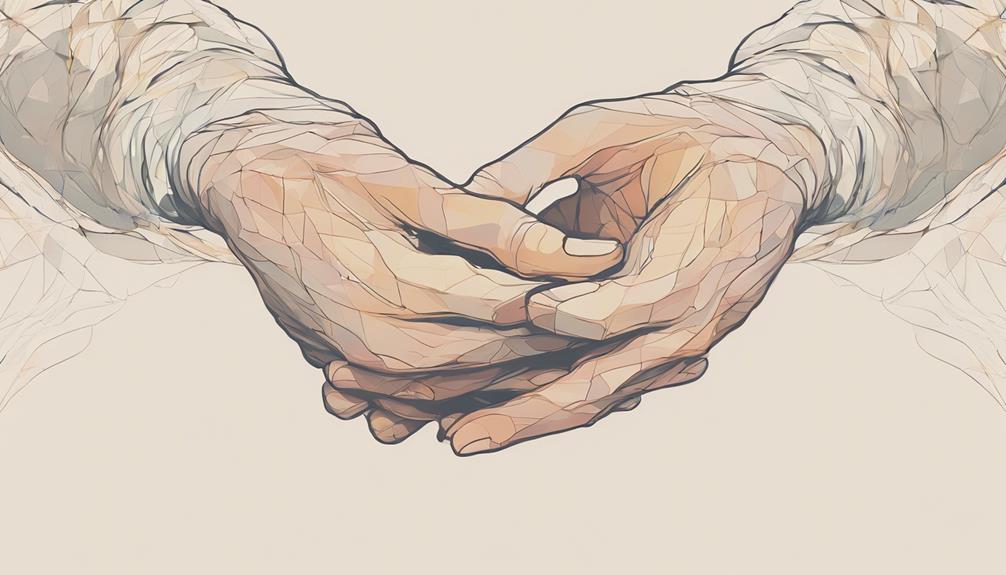Summary
- 1 Key Points
- 2 Signs of Emotional Abuse
- 3 Identify manipulative behaviors
- 4 Effects on mental health
- 5 Recognition of control tactics
- 6 Establishing boundaries
- 7 Steps for asking for help
- 8 Frequently asked questions
- 8.1 How can a toxic relationship affect a person's physical health?
- 8.2 What are some common false beliefs about toxic relationships?
- 8.3 Can toxic relationships also occur in friendships as well as romantic relationships?
- 8.4 How do cultural factors influence the perception of toxic relationships?
- 8.5 What is the role of social media in perpetuating toxic relational dynamics?
You could be in a toxic relationship If you feel constantly exhausted or anxious. Be careful about signs like questioning your feelings or being blamed for things you did not do. Manipulative behaviors, such as gaslighting or controlling finances, can undermine your self-esteem and reality. If your partner isolates you from friends or uses emotional blackmail, is a wake-up call. Don't ignore the impact on your mental health; consider therapy and Establish clear boundaries. Seek support from loved ones or professionals to regain your well-being. There are other steps you can take to protect yourself.
Key Points
- Identify signs of emotional abuse, such as constant self-doubt and blame for things not your fault.
- Recognize manipulative tactics, including gaslighting, emotional blackmail, and isolation from support systems.
- Observe control tactics, such as financial manipulation and sabotaging your work or job opportunities.
- Establish and maintain clear boundaries using 'I' statements and consistent application.
- Seek help through therapy, support groups or local domestic violence victim shelters for guidance and support.
Signs of Emotional Abuse

Recognizing emotional abuse can be difficult as it often hides behind subtle actions and words that undermine your self-esteem. You may find yourself constantly rehashing your feelings or making yourself feel like you are overreacting. For example, if your partner often ignores your opinions or makes you feel guilty for needing emotional support, these are signs of emotional abuse.
Another indication is if you often find yourself blamed for things that are not your fault. You may hear phrases like, 'You're too sensitive' or 'It's your fault I get angry.' These comments can undermine your trust over time. Your partner may also isolate you from friends and family, making it harder to maintain support systems that are vital to your well-being.
Recognizing these signs is the first step in the healing process. Seeking out friends, family members or professional counselors who can provide the support you need is critical. Establishing a strong support system can help you regain your sense of self-worth and navigate the healing process more effectively. Remember, emotional abuse is not your fault, and seeking help is a courageous and essential step.
Identify manipulative behaviors
You may notice manipulative behavior when your partner makes you question reality or makes you feel guilty for needing space. They may try to isolate you from friends and family, leaving you alone. Watch out for emotional blackmail, where they use guilt, fear or obligation to control your actions.
Gaslighting and confusion tactics
Gaslighting involves making you doubt your reality, often leaving you confused and questioning your sanity. It is one of the manipulation tactics used in toxic relationships. Your partner might say things like, "That never happened" or "You're just exaggerating" to create a communication stalemate between what you know to be true and their version of events. This form of emotional manipulation is designed to maintain power relations in their favor.
Imagine that you clearly remember a specific conversation, but your partner insists that it never happened. Over time, these repeated denials make you question your memory, your feelings, and even your judgment. This is not only frustrating, it is also a calculated move to destabilize your sense of self.
Gaslighting may also involve minimizing your emotions, making you feel as if your concerns are invalid. For example, if you express your pain over something they have done, they may accuse you of overreacting or being irrational. This serves to ignore your feelings and keep the emotional manipulation in place.
Recognizing these tactics is essential. Once you identify the pattern, you will realize that it is not your flaws or your imagination, but their need to control and dominate.
Isolation from support systems
In a toxic relationship, a common tactic is to isolate yourself from friends and family by cutting off your support systems. Your partner may begin with subtle criticisms of your loved ones, suggesting that they do not have your best interests at heart. Over time, these comments can accumulate, leading you to question and distance yourself from those who care about you.
Recognizing the warning signs is crucial. If you notice you are spending less time with friends or family because your partner does not approve or makes you feel guilty, it is a red flag. They may also be monitoring your communications, making you feel like you have to choose between your partner and your support network.
Resorting to help is essential when you realize you are isolated. Talk to someone you trust about what is happening. They can help you see the situation more clearly and offer support. Building resilience is necessary in these situations. Remember your value and the importance of your relationships outside of the toxic one.
The healing process can be challenging, but reconnecting with your support systems is a significant step. Surround yourself with positive influences and take small steps to rebuild those connections. Remember, you are not alone and help is available.
Signs of emotional blackmail
Emotional blackmail often begins with subtle guilt or threats, making you feel obligated to meet your partner's demands. They may say things like, "If you really loved me, you would do this," or "You will regret it if you don't." These manipulative tactics can erode your self-esteem and make you doubt your own judgment.
To identify emotional blackmail, look for these signs:
| Sign | Description |
|---|---|
| Induction of guilt | Your partner makes you feel guilty for not meeting his demands. |
| Threats | They threaten to harm themselves or damage the relationship if you do not comply. |
| Silent treatment | They withdraw affection or communication to manipulate your actions. |
| Exaggeration | They exaggerate their needs or your flaws to make you feel inadequate. |
Recognizing these signs is essential for building trust and improving your communication skills. If you notice these patterns, it is important to address them directly. Say, for example, "I feel manipulated when you use blame to get what you want." Open and honest communication can help you establish boundaries and protect your emotional well-being.
Effects on mental health

The ongoing stress and anxiety of a toxic relationship can seriously damage your mental well-being. You may find yourself constantly anxious, and even simple tasks can become overwhelming. This constant strain can lead to depression, anxiety disorders, and even physical health problems such as headaches or insomnia.
To begin healing, consider the benefits of therapy. Talking to a psychotherapist can bring emotional healing by helping you understand your feelings and develop coping mechanisms. Therapy can provide a safe space to express yourself without judgment, which is critical for recovery.
Incorporating self-care practices into your daily routine can make a significant difference. Simple activities such as taking a walk, reading a book or enjoying a hobby can help you relax and focus on yourself. Mindfulness techniques, such as meditation or deep breathing exercises, can help calm your mind and reduce stress levels. These practices encourage you to live in the present moment, which can be extremely grounding when you feel overwhelmed.
Recognition of control tactics
You may notice your partner trying to isolate you from friends or control your finances. These are common tactics of control in toxic relationships. Recognizing these signs is the first step in taking back your power.
Isolation from friends
One of the first signs of a toxic relationship is when your partner tries to isolate you from your friends. If you find that you are spending less and less time with your friends because your partner insists on it, this could be a red flag. This social distancing can have a serious emotional impact, making you feel lonely and dependent on your partner.
Your friends are an essential part of your support system, and the healthy boundary of friendship should be respected. If your partner constantly criticizes your friends or makes you feel guilty for wanting to spend time with them, it is important to recognize this as a control tactic. They may say things like, "I don't trust your friends" or "They don't understand our relationship" to justify their behavior.
Good communication skills are vital here. Talk openly with your friends about what is happening and listen to their concerns. They can offer you an outside perspective that may help you see the situation more clearly. Remember, a loving partner will encourage you to maintain your friendships, not diminish them. Don't let anyone make you feel guilty for wanting to stay in touch with people who care about you.
Financial manipulation
Isolating you from friends is a red flag, but financial manipulation is another common tactic used to exert control in a toxic relationship. Financial control can take many forms and is often subtle. For example, your partner may insist on managing all finances, giving you little or no access to money. They might question every purchase you make or give you a check, making you feel like a child.
These manipulative tactics aim to make you dependent on them, robbing you of your financial independence. Imagine wanting to leave but fearing that you cannot support yourself because you do not have access to funds. This is exactly how financial manipulation traps you.
Another indication is when your partner sabotages your work. They may discourage you from seeking employment or sabotage job opportunities, making it difficult for you to earn your own money. This financial control is not just about money; it is about power and control over you.
Recognizing these tactics is essential. If you notice these behaviors, it is crucial to seek help and take steps to protect your financial independence. Remember, a healthy relationship should emancipate you, not control you.
Establishing boundaries

Establishing clear boundaries is essential to safeguarding your emotional well-being in a toxic relationship. Boundaries help you maintain personal autonomy and ensure that both parties engage in healthy communication. Without them, it is easy to feel overwhelmed or to lose sight of your own needs. Here's how you can set and maintain boundaries effectively:
- Define your limits: Identify what behaviors are unacceptable to you. This could include disrespect, manipulation or constant criticism. Knowing your limits is the first step in communicating them.
- Clearly communicate: You have an open and honest conversation with the other person. Use sentences with the pronoun 'I' to express how certain actions make you feel and what changes you need to see. For example, 'I feel disrespected when my opinions are ignored.'
- Stay consistent: Once you set a boundary, maintain it. If the other person crosses it, reinforce your boundary by reminding them of your initial conversation. Consistency signals that you take your boundaries seriously.
- Practice self-care: Setting boundaries can be emotionally draining, so prioritize activities that help you recharge. Whether it's reading a book, taking a walk or spending time with friends, self-care allows you to maintain your boundaries.
Steps for asking for help
When you are in a toxic relationship, the first step to seek help may seem intimidating but it is necessary for your well-being. Start by investigating the therapeutic options. A licensed therapist can help you understand your feelings, develop coping strategies and regain control over your life. Don't hesitate to ask friends for advice or look online for recommendations.
Support groups offer another valuable resource. These groups connect you with others who have faced similar challenges. Sharing experiences and advice can be incredibly rewarding and comforting.
Counseling resources are also critical. Many communities offer services of free or low-cost consulting. Schools, workplaces and local health departments often provide information on where to find these resources.
If you are facing legal problems, such as harassment or abuse, do not overlook the need to legal assistance. Organizations such as Legal Aid provide free legal assistance to those in need. You can also contact the shelters for victims of domestic violence locals, who often offer legal services or can guide you through the process.
Frequently asked questions
How can a toxic relationship affect a person's physical health?
A toxic relationship can have a serious emotional impact on you, leading to chronic stress. This stress can cause negative behaviors, such as neglecting self-care, and result in physical problems such as headaches, fatigue, and weakened immunity.
What are some common false beliefs about toxic relationships?
You might think that toxic relationships involve only physical abuse, but emotional abuse is just as damaging. Common misunderstandings include ignoring subtle signs and behaviors, assuming it is not toxic if there is no physical harm.
Can toxic relationships also occur in friendships as well as romantic relationships?
Yes, toxic relationships can occur even in friendships. Friendship dynamics can be poisoned by toxic behaviors such as constant criticism, manipulation, or jealousy. You must recognize these signs to protect your well-being in any relationship.
How do cultural factors influence the perception of toxic relationships?
Cultural norms shape the way toxic relationships are perceived. In some cultures, certain interpersonal dynamics, such as rigid family roles or gender expectations, might be accepted, making it more difficult to recognize and act on unhealthy behaviors.
You will see how social media amplifies the toxic dynamics of relationships through the effects of cyberbullying and the dynamics of digital gaslighting. It is easy for harmful behaviors to spread and escalate online, making it harder to recognize and avoid toxicity.
